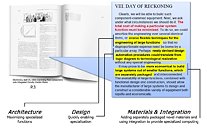DARPA to Dedicate $100 million to EDA Projects Over the Next Five Years
EDA (Electronic Design Automation) is a quintessential part of modern silicon processor design - of any kind. Be it GPUs, CPUs, or SOCs, you can bet an electronic design tool has been applied somewhere in the process. These tools serve their function in various steps of silicon design, be it allowing for automated placement of components, signal routing, power optimization, and analyzing said designs with performance and bottleneck projections. It was rumored that Bulldozer was such a flawed architecture due to the overuse (and misuse) of EDA tools in its design; but mostly, usage of these tools is done in conjunction with engineers' hand-crafted, manually laid-out circuits.
In an effort to accelerate development and reduce cost of chip design (now approaching $500 million for a bleeding-edge SoC), two programs, IDEA (Intelligent Design of Electronic Assets) and POSH (Posh Open Source Hardware), involving 15 companies and more than 200 researchers, will receive $100 million in funding over the next five years. The IDEA is to create the equivalent of a silicon compiler, aimed at significantly lowering the barriers to design chips. POSH aims to create an open-source library of silicon blocks (that circuit designers can then mix and match according to their needs), and IDEA hopes to spawn a variety of open-source and commercial tools to automate testing of those blocks and actually grafting them into SoCs and finished products. Lower development costs means that lower-volume, specialized chips can now be developed more often, thus ushering a new era of specially-designed, fixed-function chips that are more efficient than mass-volume alternatives.
In an effort to accelerate development and reduce cost of chip design (now approaching $500 million for a bleeding-edge SoC), two programs, IDEA (Intelligent Design of Electronic Assets) and POSH (Posh Open Source Hardware), involving 15 companies and more than 200 researchers, will receive $100 million in funding over the next five years. The IDEA is to create the equivalent of a silicon compiler, aimed at significantly lowering the barriers to design chips. POSH aims to create an open-source library of silicon blocks (that circuit designers can then mix and match according to their needs), and IDEA hopes to spawn a variety of open-source and commercial tools to automate testing of those blocks and actually grafting them into SoCs and finished products. Lower development costs means that lower-volume, specialized chips can now be developed more often, thus ushering a new era of specially-designed, fixed-function chips that are more efficient than mass-volume alternatives.


